Employment Law: Analyzing Company Formation, Director Duties & Ethics
VerifiedAdded on 2023/04/25
|8
|2054
|495
Report
AI Summary
This report provides a comprehensive overview of key aspects of employment law. It begins by detailing the process of company formation, emphasizing its transformation into a separate legal entity and the ease of online registration. The report then explores the consequences of corporate personality, including its impact on property ownership, shareholder protection, and the company's legal standing. Further analysis is provided on the winding up process, including the role of a liquidator in managing assets and settling debts. The responsibilities of company directors, including their duty to act in good faith and avoid conflicts of interest, are also examined. The report concludes with an ethical dilemma concerning the appointment of an executive director, weighing personal benefit against the company's need for an experienced professional, ultimately advocating for a decision that prioritizes the company's performance and ethical standards. Desklib offers a wealth of similar solved assignments and resources for students.
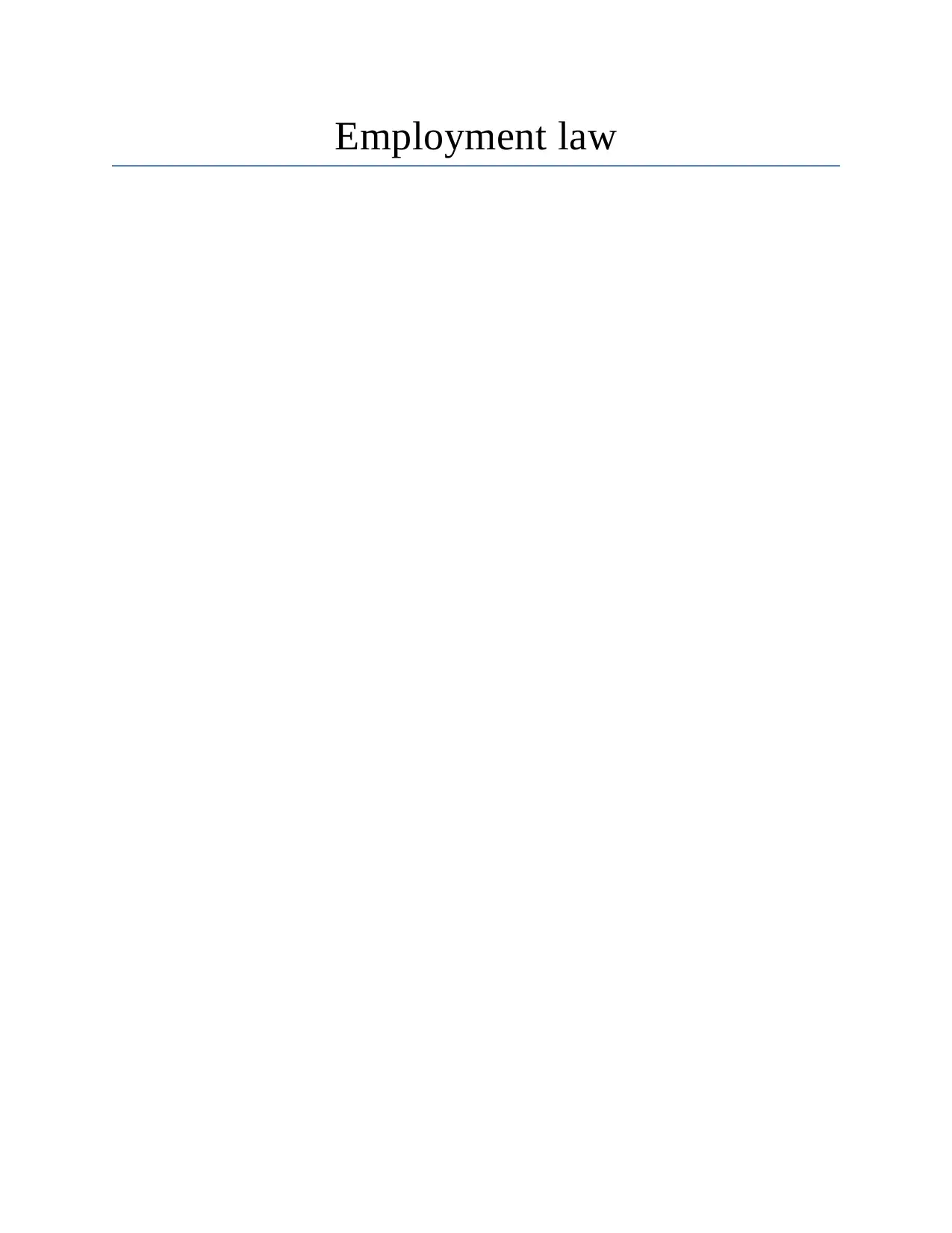
Employment law
Paraphrase This Document
Need a fresh take? Get an instant paraphrase of this document with our AI Paraphraser

Table of Contents
Part 1................................................................................................................................................3
Question 1....................................................................................................................................3
Question 2....................................................................................................................................3
Question 3....................................................................................................................................3
Question 4....................................................................................................................................3
Part 2................................................................................................................................................3
References........................................................................................................................................6
Part 1................................................................................................................................................3
Question 1....................................................................................................................................3
Question 2....................................................................................................................................3
Question 3....................................................................................................................................3
Question 4....................................................................................................................................3
Part 2................................................................................................................................................3
References........................................................................................................................................6
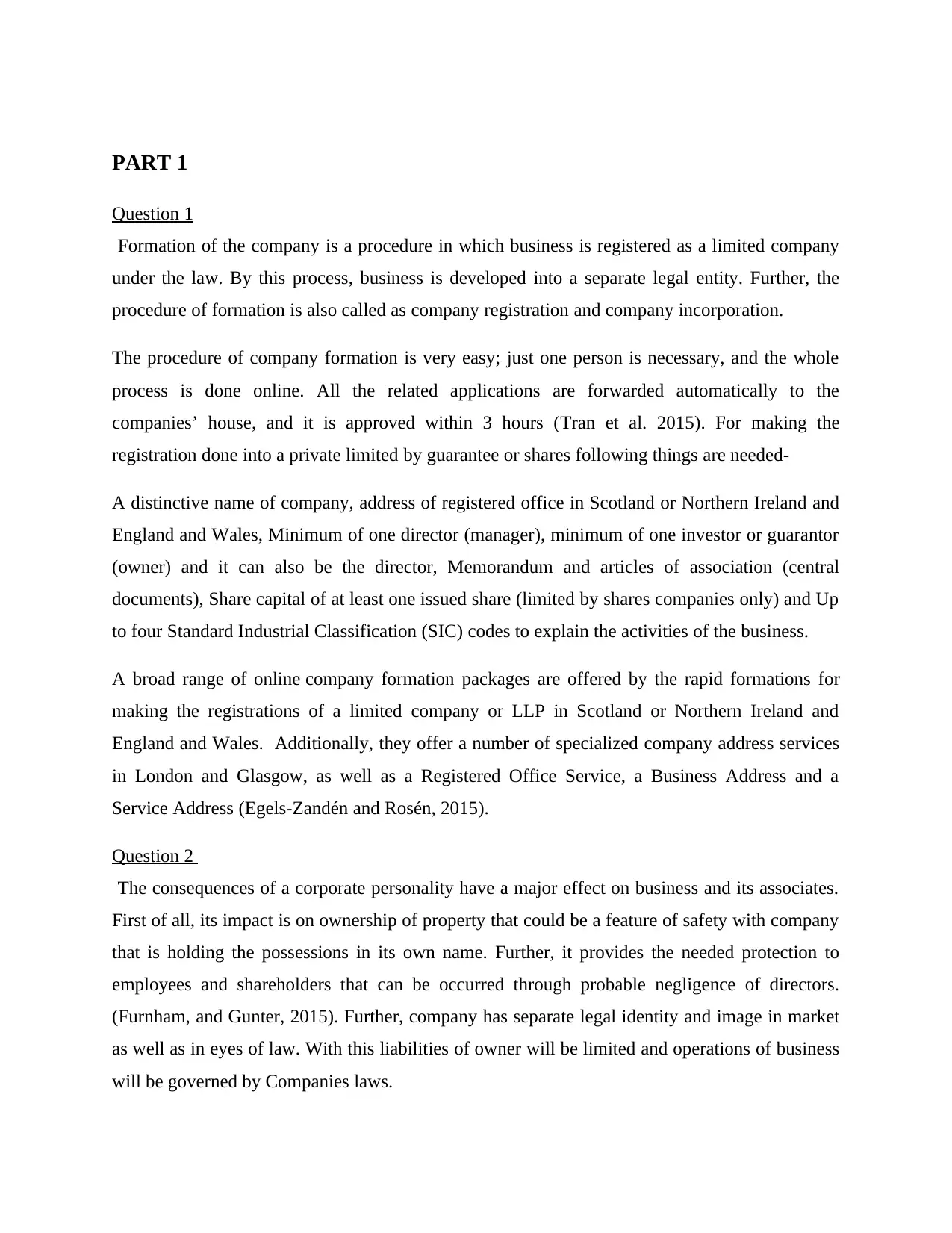
PART 1
Question 1
Formation of the company is a procedure in which business is registered as a limited company
under the law. By this process, business is developed into a separate legal entity. Further, the
procedure of formation is also called as company registration and company incorporation.
The procedure of company formation is very easy; just one person is necessary, and the whole
process is done online. All the related applications are forwarded automatically to the
companies’ house, and it is approved within 3 hours (Tran et al. 2015). For making the
registration done into a private limited by guarantee or shares following things are needed-
A distinctive name of company, address of registered office in Scotland or Northern Ireland and
England and Wales, Minimum of one director (manager), minimum of one investor or guarantor
(owner) and it can also be the director, Memorandum and articles of association (central
documents), Share capital of at least one issued share (limited by shares companies only) and Up
to four Standard Industrial Classification (SIC) codes to explain the activities of the business.
A broad range of online company formation packages are offered by the rapid formations for
making the registrations of a limited company or LLP in Scotland or Northern Ireland and
England and Wales. Additionally, they offer a number of specialized company address services
in London and Glasgow, as well as a Registered Office Service, a Business Address and a
Service Address (Egels-Zandén and Rosén, 2015).
Question 2
The consequences of a corporate personality have a major effect on business and its associates.
First of all, its impact is on ownership of property that could be a feature of safety with company
that is holding the possessions in its own name. Further, it provides the needed protection to
employees and shareholders that can be occurred through probable negligence of directors.
(Furnham, and Gunter, 2015). Further, company has separate legal identity and image in market
as well as in eyes of law. With this liabilities of owner will be limited and operations of business
will be governed by Companies laws.
Question 1
Formation of the company is a procedure in which business is registered as a limited company
under the law. By this process, business is developed into a separate legal entity. Further, the
procedure of formation is also called as company registration and company incorporation.
The procedure of company formation is very easy; just one person is necessary, and the whole
process is done online. All the related applications are forwarded automatically to the
companies’ house, and it is approved within 3 hours (Tran et al. 2015). For making the
registration done into a private limited by guarantee or shares following things are needed-
A distinctive name of company, address of registered office in Scotland or Northern Ireland and
England and Wales, Minimum of one director (manager), minimum of one investor or guarantor
(owner) and it can also be the director, Memorandum and articles of association (central
documents), Share capital of at least one issued share (limited by shares companies only) and Up
to four Standard Industrial Classification (SIC) codes to explain the activities of the business.
A broad range of online company formation packages are offered by the rapid formations for
making the registrations of a limited company or LLP in Scotland or Northern Ireland and
England and Wales. Additionally, they offer a number of specialized company address services
in London and Glasgow, as well as a Registered Office Service, a Business Address and a
Service Address (Egels-Zandén and Rosén, 2015).
Question 2
The consequences of a corporate personality have a major effect on business and its associates.
First of all, its impact is on ownership of property that could be a feature of safety with company
that is holding the possessions in its own name. Further, it provides the needed protection to
employees and shareholders that can be occurred through probable negligence of directors.
(Furnham, and Gunter, 2015). Further, company has separate legal identity and image in market
as well as in eyes of law. With this liabilities of owner will be limited and operations of business
will be governed by Companies laws.
⊘ This is a preview!⊘
Do you want full access?
Subscribe today to unlock all pages.

Trusted by 1+ million students worldwide
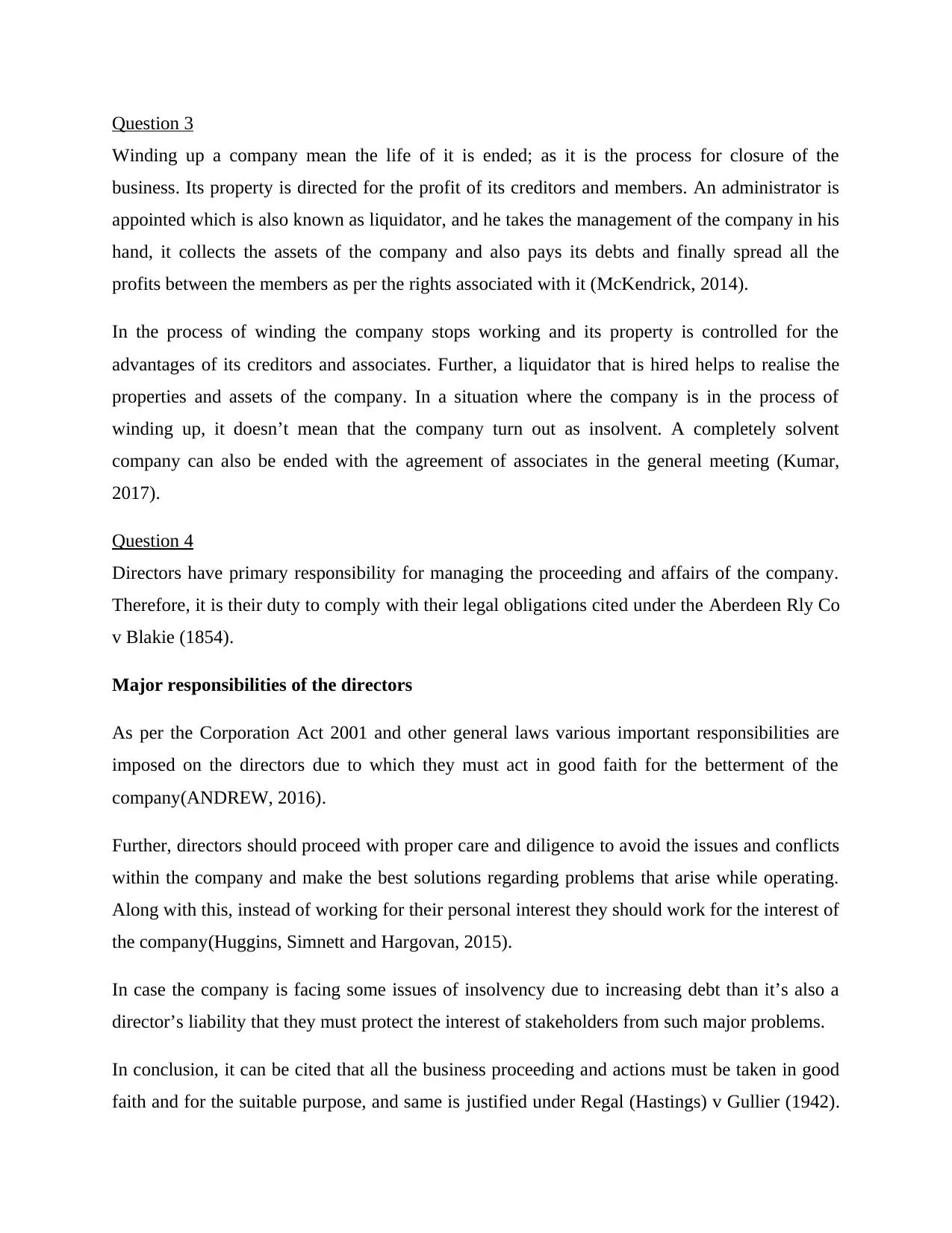
Question 3
Winding up a company mean the life of it is ended; as it is the process for closure of the
business. Its property is directed for the profit of its creditors and members. An administrator is
appointed which is also known as liquidator, and he takes the management of the company in his
hand, it collects the assets of the company and also pays its debts and finally spread all the
profits between the members as per the rights associated with it (McKendrick, 2014).
In the process of winding the company stops working and its property is controlled for the
advantages of its creditors and associates. Further, a liquidator that is hired helps to realise the
properties and assets of the company. In a situation where the company is in the process of
winding up, it doesn’t mean that the company turn out as insolvent. A completely solvent
company can also be ended with the agreement of associates in the general meeting (Kumar,
2017).
Question 4
Directors have primary responsibility for managing the proceeding and affairs of the company.
Therefore, it is their duty to comply with their legal obligations cited under the Aberdeen Rly Co
v Blakie (1854).
Major responsibilities of the directors
As per the Corporation Act 2001 and other general laws various important responsibilities are
imposed on the directors due to which they must act in good faith for the betterment of the
company(ANDREW, 2016).
Further, directors should proceed with proper care and diligence to avoid the issues and conflicts
within the company and make the best solutions regarding problems that arise while operating.
Along with this, instead of working for their personal interest they should work for the interest of
the company(Huggins, Simnett and Hargovan, 2015).
In case the company is facing some issues of insolvency due to increasing debt than it’s also a
director’s liability that they must protect the interest of stakeholders from such major problems.
In conclusion, it can be cited that all the business proceeding and actions must be taken in good
faith and for the suitable purpose, and same is justified under Regal (Hastings) v Gullier (1942).
Winding up a company mean the life of it is ended; as it is the process for closure of the
business. Its property is directed for the profit of its creditors and members. An administrator is
appointed which is also known as liquidator, and he takes the management of the company in his
hand, it collects the assets of the company and also pays its debts and finally spread all the
profits between the members as per the rights associated with it (McKendrick, 2014).
In the process of winding the company stops working and its property is controlled for the
advantages of its creditors and associates. Further, a liquidator that is hired helps to realise the
properties and assets of the company. In a situation where the company is in the process of
winding up, it doesn’t mean that the company turn out as insolvent. A completely solvent
company can also be ended with the agreement of associates in the general meeting (Kumar,
2017).
Question 4
Directors have primary responsibility for managing the proceeding and affairs of the company.
Therefore, it is their duty to comply with their legal obligations cited under the Aberdeen Rly Co
v Blakie (1854).
Major responsibilities of the directors
As per the Corporation Act 2001 and other general laws various important responsibilities are
imposed on the directors due to which they must act in good faith for the betterment of the
company(ANDREW, 2016).
Further, directors should proceed with proper care and diligence to avoid the issues and conflicts
within the company and make the best solutions regarding problems that arise while operating.
Along with this, instead of working for their personal interest they should work for the interest of
the company(Huggins, Simnett and Hargovan, 2015).
In case the company is facing some issues of insolvency due to increasing debt than it’s also a
director’s liability that they must protect the interest of stakeholders from such major problems.
In conclusion, it can be cited that all the business proceeding and actions must be taken in good
faith and for the suitable purpose, and same is justified under Regal (Hastings) v Gullier (1942).
Paraphrase This Document
Need a fresh take? Get an instant paraphrase of this document with our AI Paraphraser
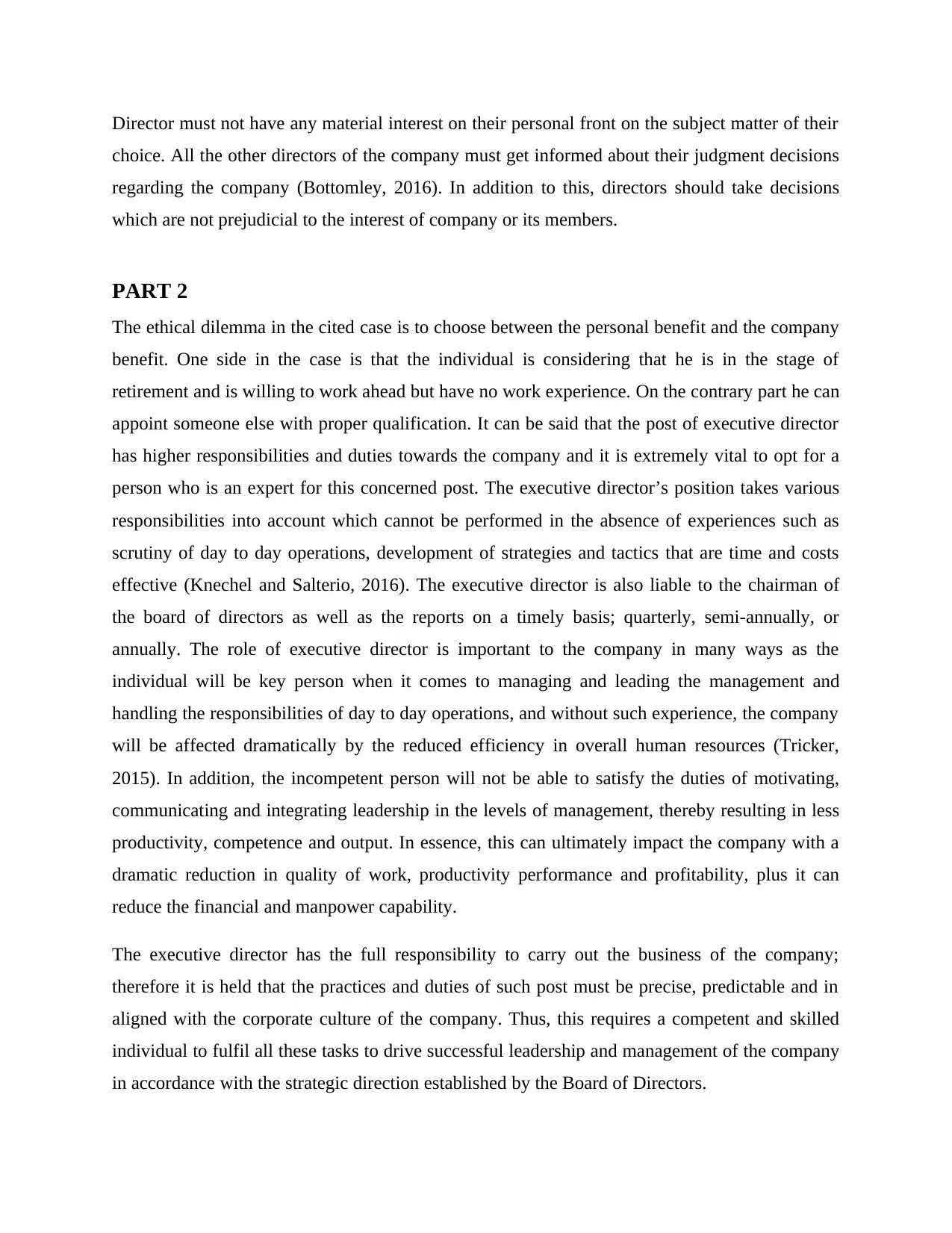
Director must not have any material interest on their personal front on the subject matter of their
choice. All the other directors of the company must get informed about their judgment decisions
regarding the company (Bottomley, 2016). In addition to this, directors should take decisions
which are not prejudicial to the interest of company or its members.
PART 2
The ethical dilemma in the cited case is to choose between the personal benefit and the company
benefit. One side in the case is that the individual is considering that he is in the stage of
retirement and is willing to work ahead but have no work experience. On the contrary part he can
appoint someone else with proper qualification. It can be said that the post of executive director
has higher responsibilities and duties towards the company and it is extremely vital to opt for a
person who is an expert for this concerned post. The executive director’s position takes various
responsibilities into account which cannot be performed in the absence of experiences such as
scrutiny of day to day operations, development of strategies and tactics that are time and costs
effective (Knechel and Salterio, 2016). The executive director is also liable to the chairman of
the board of directors as well as the reports on a timely basis; quarterly, semi-annually, or
annually. The role of executive director is important to the company in many ways as the
individual will be key person when it comes to managing and leading the management and
handling the responsibilities of day to day operations, and without such experience, the company
will be affected dramatically by the reduced efficiency in overall human resources (Tricker,
2015). In addition, the incompetent person will not be able to satisfy the duties of motivating,
communicating and integrating leadership in the levels of management, thereby resulting in less
productivity, competence and output. In essence, this can ultimately impact the company with a
dramatic reduction in quality of work, productivity performance and profitability, plus it can
reduce the financial and manpower capability.
The executive director has the full responsibility to carry out the business of the company;
therefore it is held that the practices and duties of such post must be precise, predictable and in
aligned with the corporate culture of the company. Thus, this requires a competent and skilled
individual to fulfil all these tasks to drive successful leadership and management of the company
in accordance with the strategic direction established by the Board of Directors.
choice. All the other directors of the company must get informed about their judgment decisions
regarding the company (Bottomley, 2016). In addition to this, directors should take decisions
which are not prejudicial to the interest of company or its members.
PART 2
The ethical dilemma in the cited case is to choose between the personal benefit and the company
benefit. One side in the case is that the individual is considering that he is in the stage of
retirement and is willing to work ahead but have no work experience. On the contrary part he can
appoint someone else with proper qualification. It can be said that the post of executive director
has higher responsibilities and duties towards the company and it is extremely vital to opt for a
person who is an expert for this concerned post. The executive director’s position takes various
responsibilities into account which cannot be performed in the absence of experiences such as
scrutiny of day to day operations, development of strategies and tactics that are time and costs
effective (Knechel and Salterio, 2016). The executive director is also liable to the chairman of
the board of directors as well as the reports on a timely basis; quarterly, semi-annually, or
annually. The role of executive director is important to the company in many ways as the
individual will be key person when it comes to managing and leading the management and
handling the responsibilities of day to day operations, and without such experience, the company
will be affected dramatically by the reduced efficiency in overall human resources (Tricker,
2015). In addition, the incompetent person will not be able to satisfy the duties of motivating,
communicating and integrating leadership in the levels of management, thereby resulting in less
productivity, competence and output. In essence, this can ultimately impact the company with a
dramatic reduction in quality of work, productivity performance and profitability, plus it can
reduce the financial and manpower capability.
The executive director has the full responsibility to carry out the business of the company;
therefore it is held that the practices and duties of such post must be precise, predictable and in
aligned with the corporate culture of the company. Thus, this requires a competent and skilled
individual to fulfil all these tasks to drive successful leadership and management of the company
in accordance with the strategic direction established by the Board of Directors.
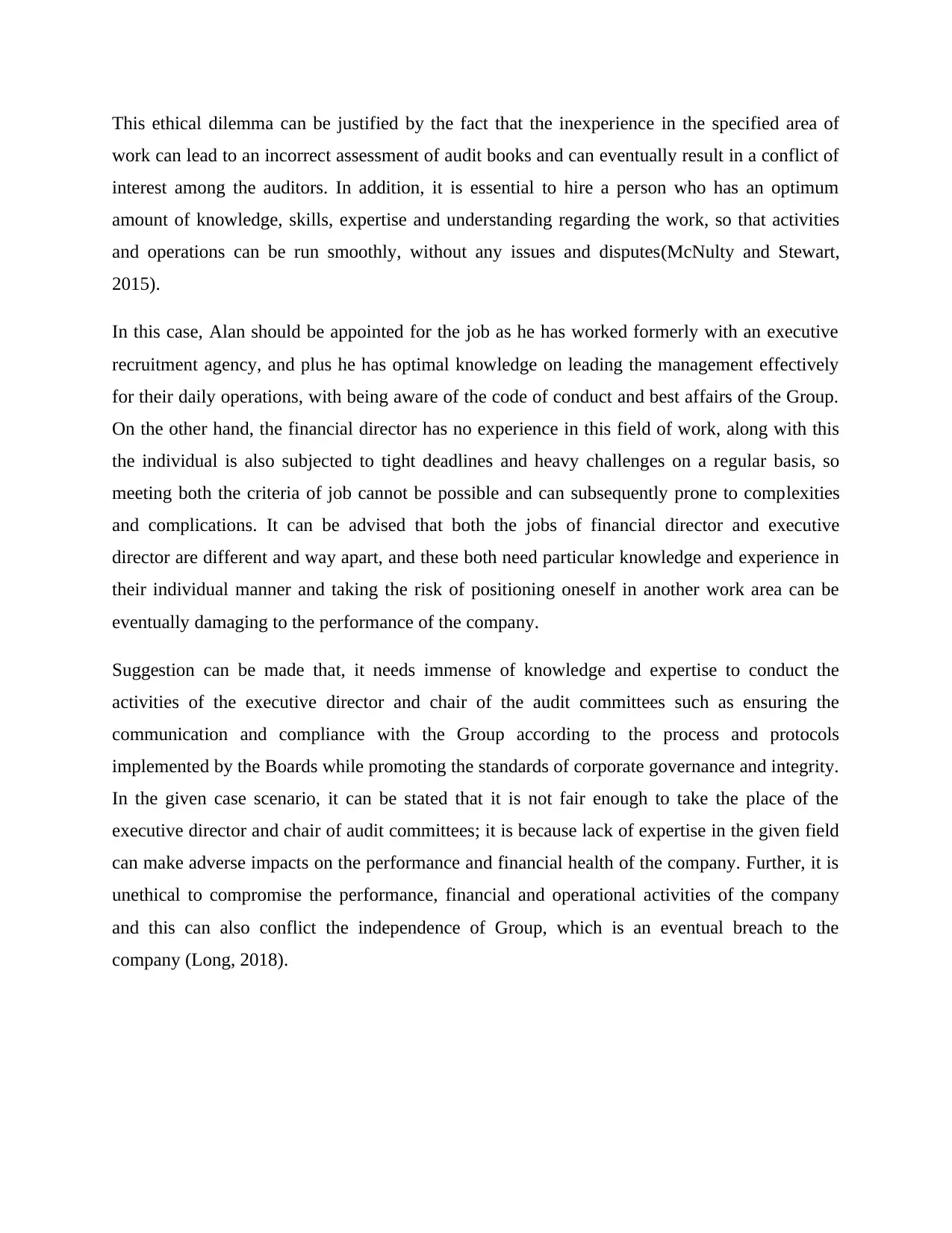
This ethical dilemma can be justified by the fact that the inexperience in the specified area of
work can lead to an incorrect assessment of audit books and can eventually result in a conflict of
interest among the auditors. In addition, it is essential to hire a person who has an optimum
amount of knowledge, skills, expertise and understanding regarding the work, so that activities
and operations can be run smoothly, without any issues and disputes(McNulty and Stewart,
2015).
In this case, Alan should be appointed for the job as he has worked formerly with an executive
recruitment agency, and plus he has optimal knowledge on leading the management effectively
for their daily operations, with being aware of the code of conduct and best affairs of the Group.
On the other hand, the financial director has no experience in this field of work, along with this
the individual is also subjected to tight deadlines and heavy challenges on a regular basis, so
meeting both the criteria of job cannot be possible and can subsequently prone to complexities
and complications. It can be advised that both the jobs of financial director and executive
director are different and way apart, and these both need particular knowledge and experience in
their individual manner and taking the risk of positioning oneself in another work area can be
eventually damaging to the performance of the company.
Suggestion can be made that, it needs immense of knowledge and expertise to conduct the
activities of the executive director and chair of the audit committees such as ensuring the
communication and compliance with the Group according to the process and protocols
implemented by the Boards while promoting the standards of corporate governance and integrity.
In the given case scenario, it can be stated that it is not fair enough to take the place of the
executive director and chair of audit committees; it is because lack of expertise in the given field
can make adverse impacts on the performance and financial health of the company. Further, it is
unethical to compromise the performance, financial and operational activities of the company
and this can also conflict the independence of Group, which is an eventual breach to the
company (Long, 2018).
work can lead to an incorrect assessment of audit books and can eventually result in a conflict of
interest among the auditors. In addition, it is essential to hire a person who has an optimum
amount of knowledge, skills, expertise and understanding regarding the work, so that activities
and operations can be run smoothly, without any issues and disputes(McNulty and Stewart,
2015).
In this case, Alan should be appointed for the job as he has worked formerly with an executive
recruitment agency, and plus he has optimal knowledge on leading the management effectively
for their daily operations, with being aware of the code of conduct and best affairs of the Group.
On the other hand, the financial director has no experience in this field of work, along with this
the individual is also subjected to tight deadlines and heavy challenges on a regular basis, so
meeting both the criteria of job cannot be possible and can subsequently prone to complexities
and complications. It can be advised that both the jobs of financial director and executive
director are different and way apart, and these both need particular knowledge and experience in
their individual manner and taking the risk of positioning oneself in another work area can be
eventually damaging to the performance of the company.
Suggestion can be made that, it needs immense of knowledge and expertise to conduct the
activities of the executive director and chair of the audit committees such as ensuring the
communication and compliance with the Group according to the process and protocols
implemented by the Boards while promoting the standards of corporate governance and integrity.
In the given case scenario, it can be stated that it is not fair enough to take the place of the
executive director and chair of audit committees; it is because lack of expertise in the given field
can make adverse impacts on the performance and financial health of the company. Further, it is
unethical to compromise the performance, financial and operational activities of the company
and this can also conflict the independence of Group, which is an eventual breach to the
company (Long, 2018).
⊘ This is a preview!⊘
Do you want full access?
Subscribe today to unlock all pages.

Trusted by 1+ million students worldwide
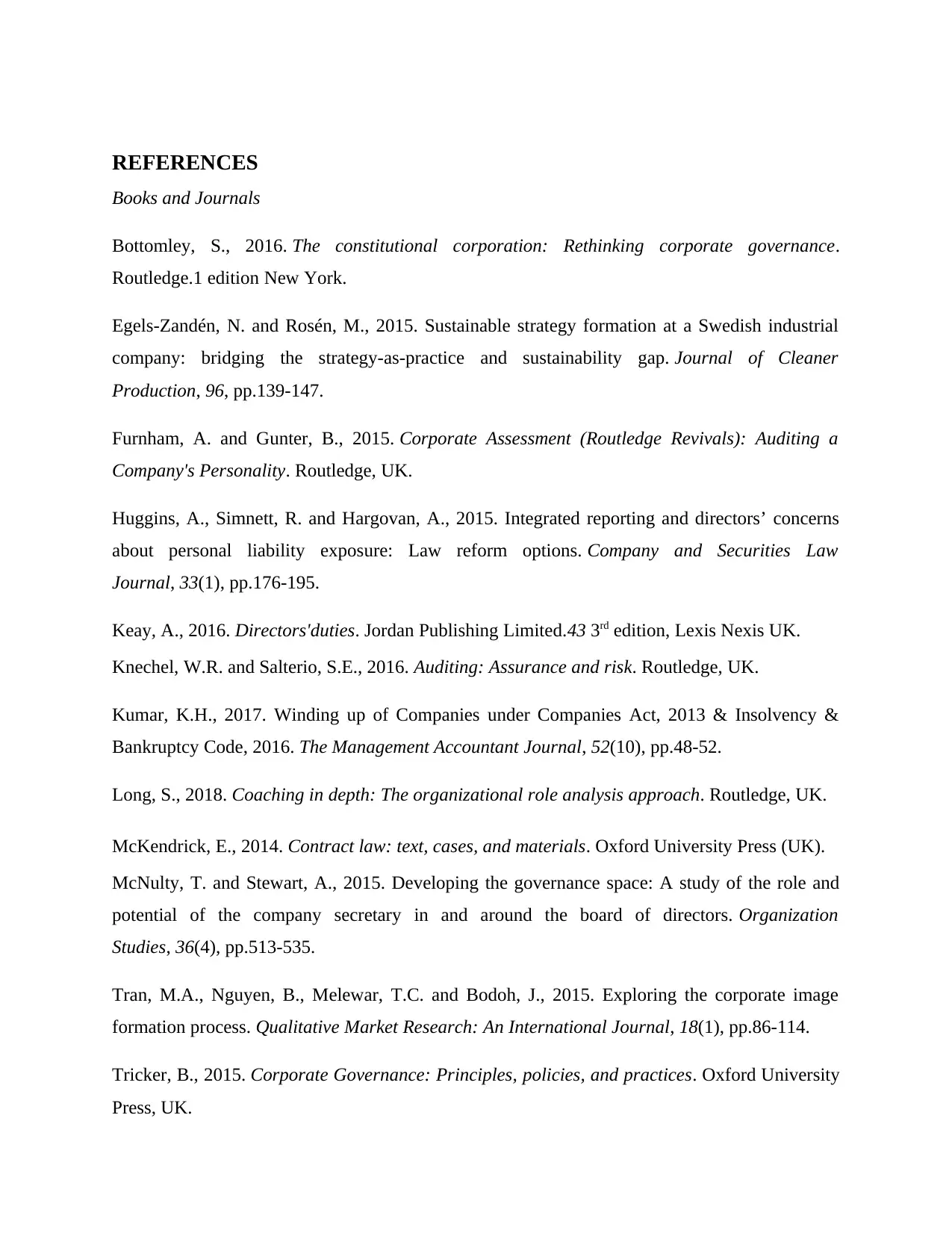
REFERENCES
Books and Journals
Bottomley, S., 2016. The constitutional corporation: Rethinking corporate governance.
Routledge.1 edition New York.
Egels-Zandén, N. and Rosén, M., 2015. Sustainable strategy formation at a Swedish industrial
company: bridging the strategy-as-practice and sustainability gap. Journal of Cleaner
Production, 96, pp.139-147.
Furnham, A. and Gunter, B., 2015. Corporate Assessment (Routledge Revivals): Auditing a
Company's Personality. Routledge, UK.
Huggins, A., Simnett, R. and Hargovan, A., 2015. Integrated reporting and directors’ concerns
about personal liability exposure: Law reform options. Company and Securities Law
Journal, 33(1), pp.176-195.
Keay, A., 2016. Directors'duties. Jordan Publishing Limited.43 3rd edition, Lexis Nexis UK.
Knechel, W.R. and Salterio, S.E., 2016. Auditing: Assurance and risk. Routledge, UK.
Kumar, K.H., 2017. Winding up of Companies under Companies Act, 2013 & Insolvency &
Bankruptcy Code, 2016. The Management Accountant Journal, 52(10), pp.48-52.
Long, S., 2018. Coaching in depth: The organizational role analysis approach. Routledge, UK.
McKendrick, E., 2014. Contract law: text, cases, and materials. Oxford University Press (UK).
McNulty, T. and Stewart, A., 2015. Developing the governance space: A study of the role and
potential of the company secretary in and around the board of directors. Organization
Studies, 36(4), pp.513-535.
Tran, M.A., Nguyen, B., Melewar, T.C. and Bodoh, J., 2015. Exploring the corporate image
formation process. Qualitative Market Research: An International Journal, 18(1), pp.86-114.
Tricker, B., 2015. Corporate Governance: Principles, policies, and practices. Oxford University
Press, UK.
Books and Journals
Bottomley, S., 2016. The constitutional corporation: Rethinking corporate governance.
Routledge.1 edition New York.
Egels-Zandén, N. and Rosén, M., 2015. Sustainable strategy formation at a Swedish industrial
company: bridging the strategy-as-practice and sustainability gap. Journal of Cleaner
Production, 96, pp.139-147.
Furnham, A. and Gunter, B., 2015. Corporate Assessment (Routledge Revivals): Auditing a
Company's Personality. Routledge, UK.
Huggins, A., Simnett, R. and Hargovan, A., 2015. Integrated reporting and directors’ concerns
about personal liability exposure: Law reform options. Company and Securities Law
Journal, 33(1), pp.176-195.
Keay, A., 2016. Directors'duties. Jordan Publishing Limited.43 3rd edition, Lexis Nexis UK.
Knechel, W.R. and Salterio, S.E., 2016. Auditing: Assurance and risk. Routledge, UK.
Kumar, K.H., 2017. Winding up of Companies under Companies Act, 2013 & Insolvency &
Bankruptcy Code, 2016. The Management Accountant Journal, 52(10), pp.48-52.
Long, S., 2018. Coaching in depth: The organizational role analysis approach. Routledge, UK.
McKendrick, E., 2014. Contract law: text, cases, and materials. Oxford University Press (UK).
McNulty, T. and Stewart, A., 2015. Developing the governance space: A study of the role and
potential of the company secretary in and around the board of directors. Organization
Studies, 36(4), pp.513-535.
Tran, M.A., Nguyen, B., Melewar, T.C. and Bodoh, J., 2015. Exploring the corporate image
formation process. Qualitative Market Research: An International Journal, 18(1), pp.86-114.
Tricker, B., 2015. Corporate Governance: Principles, policies, and practices. Oxford University
Press, UK.
Paraphrase This Document
Need a fresh take? Get an instant paraphrase of this document with our AI Paraphraser

1 out of 8
Related Documents
Your All-in-One AI-Powered Toolkit for Academic Success.
+13062052269
info@desklib.com
Available 24*7 on WhatsApp / Email
![[object Object]](/_next/static/media/star-bottom.7253800d.svg)
Unlock your academic potential
Copyright © 2020–2025 A2Z Services. All Rights Reserved. Developed and managed by ZUCOL.




